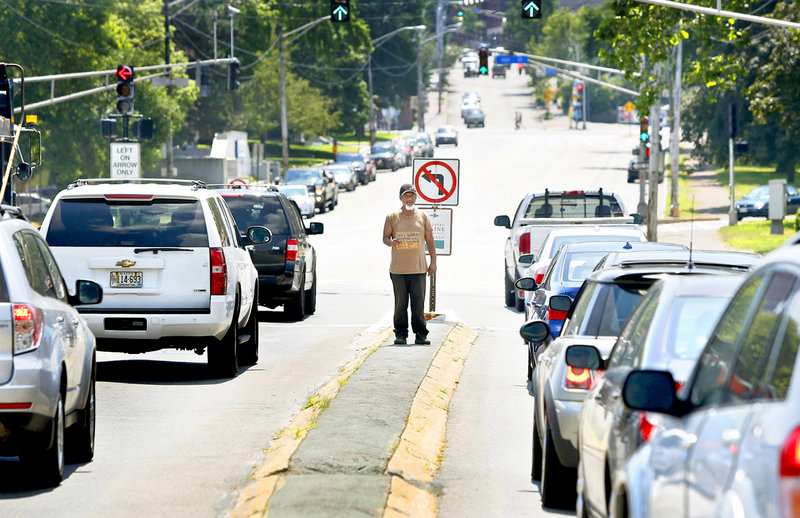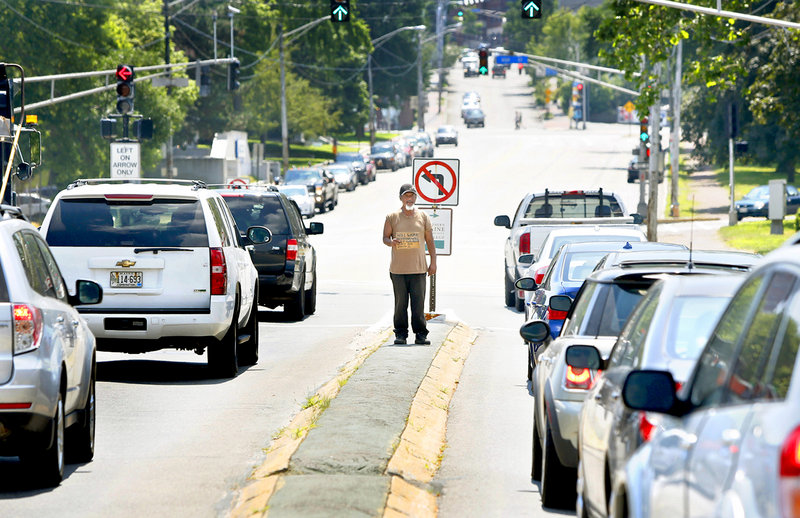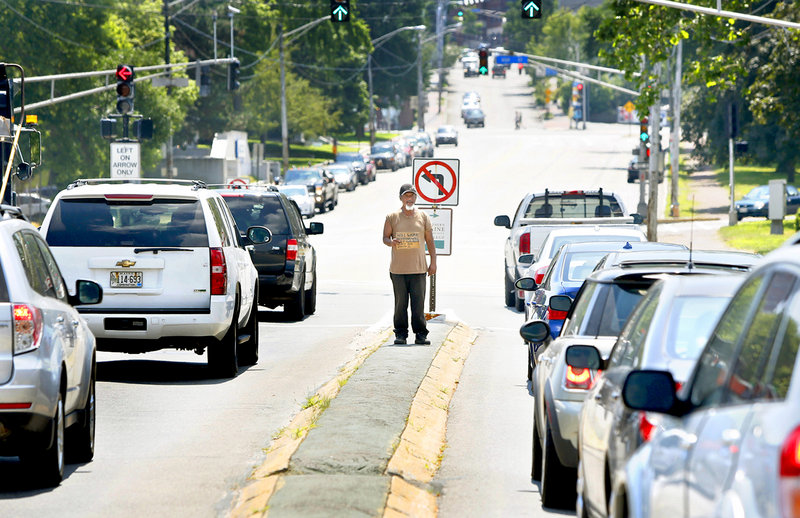PORTLAND — Police are using a new city ordinance to crack down on panhandling in street medians, but they aren’t issuing civil summonses and fines as prescribed in the law.
Officers have instead used criminal trespass notices – and the threat of jail time – to keep chronic panhandlers off the medians.
City officials said recently that police have summoned no one for violating the panhandling ordinance, which took effect Aug. 15. They neglected to say that police have issued five criminal trespass notices, leading to three arrests.
“Police are not enforcing the ordinance directly,” said Merritt Heminway, an attorney who represented a homeless man arrested for panhandling in a median. He said criminal trespass notices are excessive because they restrict where people can go, and carry the threat of arrest.
Portland’s ordinance does not say explicitly that panhandling on a median is trespassing or a crime, but any violation of the ordinance creates an underlying offense and allows police to issue a criminal trespass notice. Violation of an order not to trespass – even on public property – is a crime and grounds for arrest.
The punishment for violating the ordinance is a civil citation, similar to a parking ticket, costing the offender $100 to $500. Violating a criminal trespass notice is a Class E crime, punishable by as much as six months in jail.
The notices are effective for six months, prohibiting the targeted people from being on any median in the city.
Michael Stoops, a community organizer with the Washington, D.C.-based National Coalition for the Homeless, said police are criminalizing homelessness nationally. However, “I think it is unique (that) the city of Portland is going after these offenses with a more serious charge,” Stoops said.
Police officers’ use of criminal trespass notices has been criticized by advocates for the poor.
A no-trespass order in a dispute between a landlord and tenant in Westbrook led to a federal lawsuit against the city in July. The American Civil Liberties Union of Maine said at the time that police departments are misusing the law, in part to keep homeless people out of parks and squares.
In Portland, a 54-year-old homeless man, Leroy Gove, was issued a criminal trespass notice on Aug. 27 for holding a sign in a median at the intersection of Congress and St. John streets.
When officers found Gove standing in the same median several days later, he was arrested. He pleaded guilty to trespassing and spent 18 hours in jail.
Gove was arrested again Sept. 11, a day when Heminway was working as a court-appointed defense lawyer. He convinced Gove to fight the charge.
Heminway said he was prepared to argue that the broadly worded criminal trespass notice violated Gove’s First Amendment right to assembly. At trial, he was going to contest the trespass notice and request that the judge rule on the constitutionality of the ordinance itself, he said.
An assistant district attorney decided not to pursue the case, so Heminway never made that argument.
“I think (Gove) had a strong constitutional argument that the criminal trespass order was unlawfully issued,” said Heminway, who interprets the order as meaning Gove cannot be on any median, at any time, for any reason.
The Cumberland County District Attorney’s Office did not respond to requests for comment on Monday or Tuesday.
Portland Police Chief Michael Sauschuck said Tuesday that officers have discretion when they issue criminal trespass notices for public spaces, especially with chronic offenders who are unable to pay fines or unlikely to show up in court when summoned.
“These folks are repeat offenders who are not going to listen to ordinance violations,” Sauschuck said.
But the amount of discretion that officers have in enforcing the panhandling ordinance through criminal or civil penalties concerns the ACLU of Maine.
“Courts have consistently found that excessive discretion by police or other decision-makers is incompatible with the protections of the First Amendment,” said Zachary Heiden, the organization’s legal director. “The penalty for violating the ordinance is supposed to be a civil violation and not an arrest.”
The ACLU of Maine, along with the Boston-based Goodwin Proctor law firm, has challenged Portland’s ordinance in court on behalf of three residents, contending that it restricts their First Amendment rights to free speech.
Under the ordinance, a median is defined as “a paved or planted area of public right of way dividing a street or highway into two lanes according to direction of travel.” That definition covers narrow medians and larger areas such as Boothby Square on Fore Street and the grassy expanse along Franklin Street from Middle Street to Marginal Way.
Mayor Michael Brennan, who said last week that no one had been cited under the ordinance, rejected the assertion that the city is taking a harder line against panhandlers by using trespass notices. He defended the city’s enforcement of the ordinance.
“What I said was true: There haven’t been any citations that have been issued,” Brennan said Monday. “A citation is different than criminal trespassing. Criminal trespassing is like a warning.”
Brennan said he was not aware of the arrests made as a result of the warnings.
Sauschuck said he also was unaware that arrests had been made under the ordinance, until the issue was raised by a reporter.
Neighborhood Prosecutor Trish McAllister said the city has not issued any civil citations for ordinance violations, but five people have received criminal trespass notices for panhandling on medians.
Sauschuck said a review of the criminal histories of three of those people showed that police had had a total of 266 contacts with them, including 11 criminal trespass notices filed by businesses or the Portland Housing Authority.
According to court documents in his case, Gove, who was reportedly intoxicated, refused to leave the median when given a verbal warning by officers on Aug. 27. The documents say he told the officer, “I’ll go out on any median anytime I want. (Expletive) you.”
Gove was arrested on Sept. 3 for returning to the median. Police were called when he walked out into traffic. Gove told police that he went into the road because someone yelled at him to get a job. “Of course I went over to him,” he said, according to court documents.
On Sept. 11, Gove returned to the same median and ran into the intersection of Congress and St. John streets when approached by police. The documents say he waved his arms to stop traffic for an ambulance with its emergency lights flashing.
“There are some guys out there who are not going to play ball,” Sauschuck said.
Randy Billings can be contacted at 791-6346 or at:
Twitter: @randybillings
@randybillings
Send questions/comments to the editors.






Success. Please wait for the page to reload. If the page does not reload within 5 seconds, please refresh the page.
Enter your email and password to access comments.
Hi, to comment on stories you must . This profile is in addition to your subscription and website login.
Already have a commenting profile? .
Invalid username/password.
Please check your email to confirm and complete your registration.
Only subscribers are eligible to post comments. Please subscribe or login first for digital access. Here’s why.
Use the form below to reset your password. When you've submitted your account email, we will send an email with a reset code.